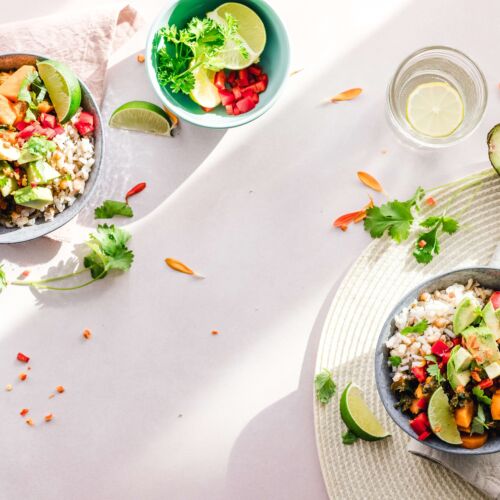5 Tips on How to Challenge the Food Police
by Dawid Furman

Challenging The Food Police is the 4th principle of Intuitive Eating outlined by Tribole & Resch in the Intuitive Eating Workbook.
Everyone enters the world as an innocent child, however as you grow older you may get exposed to many negative thoughts around food.
These negative thoughts are often related to diet culture and make you feel a sense of guilt for eating certain foods by the so-called “Food Police.”
It is important to be aware of your thoughts and treat them in a non-judgemental manner in order to Challenge the Food Police.
Learning to speak up for yourself is vital to refrain these thoughts and make them vanish.
Follow on reading for 5 tips on how to Challenge the Food Police:
1. Examine Your Beliefs
Have you ever had a negative belief about food such as that carbohydrates are not necessary during the day or that you should not eat foods with flour?
Your beliefs regarding food are usually brought upon by many factors such as the voices of your teachers or parents which often become your own thoughts over time.
It is important to reflect on where your beliefs about eating or your body originated.
These negative beliefs are often false and can negatively affect your behaviour if not challenged.
2. Challenge Your Food Police Thoughts
The first method of challenging “Food Police,” thoughts is through cognitive behaviour therapy (CBT) which involves you evaluating your negative thoughts and reframing them if faulty.
Here you describe a distorted thought and reframe it based on your actual experience regarding the thought.
For example, if the thought is that you should not eat carbohydrates during the day, you will ask yourself are their times where you will need carbs and reframe the thought to “I have much more energy throughout the day after eating carbs and do not binge on carbs during the night.”
The second method of challenging the food police is to reframe the negative thoughts based on facts.
For example, if you believe you will never get a partner if you’re not a certain size you will reframe this thought based on the fact that you have several friends of all sizes with partners.
3. Approach Your Thoughts with Curious Awareness
“I just blew my eating plan, therefore i’ll never…” Stop the story right there. By doing this your thoughts around food may take up less space in your mind. Try to observe your thoughts without passing any judgement on them and by stopping the story you create.
Approaching your thoughts with curious awareness is a form of mindfulness, which stops you from creating a false narrative around a thought and creating needless anxiety.
Think of a root thought you may have had and now think about how adding a judgmental narrative to this thought made you feel.
When the same thought arises, practice observing it without adding judgement which can be done by placing awareness at the present moment instead of the thought (which is usually in the past or the future) with the help of using your senses such as touch sight etc.
Learning and developing a regular meditation practice can help in this.
4. Reframe Negative Thoughts
Thoughts can often have a powerful impact on your feelings and in turn behaviours, and negative emotions are often preceded by negative thoughts.
Think of negative feelings such as anxiety and reflect back on any negative thoughts you had in the past and ask yourself did it create any of the negative feelings.
Now ask yourself did these negative feelings in turn make you take part in overeating behaviours.
For this reason, it’s important to transform negative self-talk into positive as this will stop the process that leads to overeating.
This can be done with the help of the “spiral of healing” which involves looking at change as a slow process with many loops, and not as a straightforward process with no ups and downs like in the diet mentality.
5. Challenge Food Rules
You may have created many food rules throughout your life which are based on old beliefs and are formulated because of diet thinking e.g. you may avoid a certain type of food.
Think of food rules that you have created and reframe them to more flexible versions.
Also, your family’s food rules from when you were young about what you can and cannot eat may have had an influence on your belief system about food.
Be able to distinguish between your own beliefs from your families, by reflecting on how you feel about your families’ rules about food.
If you found this blog post interesting, please continue reading our 10-principal series on Intuitive Eating. Intuitive Eating is challenging but with the help of a Registered Dietitian it is common that clients will break through and get off their diet rollercoaster for the long haul and open up space in their life to feel more freedom.
If you are interested to learn more about Intuitive Eating, continue on reading:
- Ditch The Diet Mentality
- Honor Your Hunger
- Make Peace With Food
- Challenge The Food Police
- Feel Your Fullness
- Discover The Satisfaction Factor
- Cope with Your Feelings Without Using Food
- Respect Your Body
- Exercise: Feel the Difference
- Honour Your Health: Feel the Difference
Find Your Registered Dietitian here:
On Dietitian Directory you can find all sorts of Dietitians including Intuitive Eating Dietitians, Weight Inclusive Dietitians, Mindful Eating Dietitians and Emotional Eating Dietitians
About the Author: Dawid Furman is a nutrition and exercise science student studying at the South East Technological University in Ireland and hopes to pursue a career as a dietitian in the future.
Reviewed by: Lindsey McGregor, RD
Images: from Unsplash and Pexels
The Site is not intended to be a substitute for professional advice. Under no circumstances will we be liable for any loss or damage caused by your reliance on information obtained through the Site. You are responsible for evaluating the accuracy, completeness, or usefulness of any information, opinion, advice, or other content available through the Site. Please seek the advice of professionals, as appropriate, regarding the evaluation of any specific information, opinion, advice, or other content. Never disregard professional advice, including medical advice, or delay in seeking it because of something you have read on this Site.



